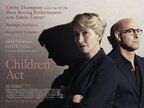When you are young, falling in love with a person may not only be out of love, nor is it a worldly obsession with material things. It is often the yearning for a way of life, the appreciation of human nature or the worship of some talents. Hope that the other party can guide or fill in their own.
It's like a student walking into a long-awaited university, full of idealism. This young man has such rich and sincere feelings for the judge and his Lady, full of love, admiration and curiosity. He looked forward to being a better version of himself here at the judge, even as a tenant and doing chores for her.
Such a young man grew up in a dogmatic environment, where everything was written by others, he was not allowed to think, and the environment did not give encouragement. He doesn't see himself in life, he thinks he believes in God, but in the end finds out that he doesn't understand neither his religion nor his family, nor himself at all.
Many people lose this sincerity and enthusiasm that they still hope that they can continue to grow, and they are more obsessed with daily trivialities and comparisons with others.
And the judge suddenly realized that he had been "set" in the role of judge for a long time, and professional consciousness replaced the genuine reaction.
When the juvenile was "awakened" by the judge during the ward visit, he also tried to arouse the human, wild and free part of the judge's heart.
This is a film about self-discovery and growth, an eternal topic. In mythology, the journey and pain of the protagonist are the dramatic expressions of growth.
Instead of constantly letting oracles or xx gods guide you, I think at all times, trust yourself first and don't let anyone tell you who you are.
View more about The Children Act reviews











